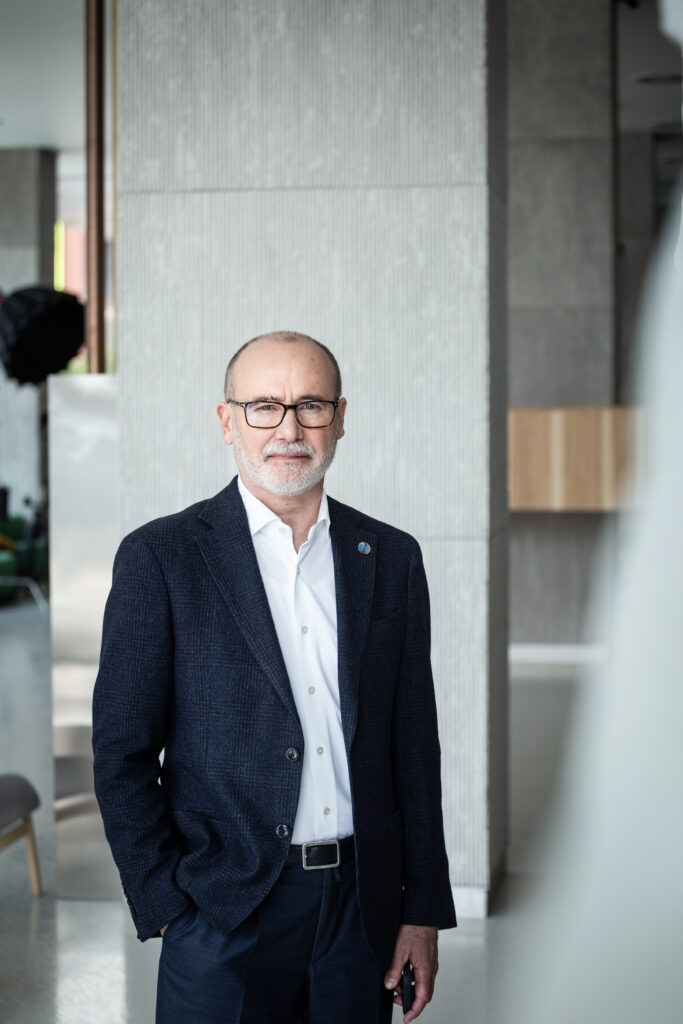
Forbes brought together the youngest and one of the most experienced CEOs of large Ukrainian companies. Viktor Ivanchyk, CEO of Astarta, and Sergey Pavlyk, CEO of Bolt in Ukraine, talked about strategy, leadership, effective management, and the most significant risks of their businesses.
Viktor Ivanchyk on Strategy and Competitors
“As the agricultural market is in surplus, we compete on the domestic market with product quality, favourable delivery terms, and payment. On the foreign market, we compete according to the supply and demand balance model that has already been established there. We promote our products in partnership with systemic local value companies.”
On the Business Structure
“When we were a private company, there was more centralisation, and the company was focused on a leadership model. When we became public, we introduced a corporate governance system. At the strategic decision-making level, we have a board of directors, including independent directors. The Ukrainian top management team manages the holding’s operating companies.
I categorically reject things that bureaucratise the work, but we stand for order and a systematic approach. That’s why we created a project and process management office, an operational efficiency management office, and an engineering centre. We have a sustainable practice of creating cross-business, cross-functional teams to generate and implement new ideas. Systemic things work.”
On the Role of Digitalisation in Business
“We digitise processes through our in-house IT company AgriChain, which has been developing a unified digital agribusiness management system since 2018. In addition to meeting our needs, we offer its products to the market.
We have many business segments with entirely different processes, technologies, controls and risks, including natural risks. That is why we are moving gradually, digitalising operations one by one, filling our systems with high-quality data, and developing artificial intelligence-based tools for forecasting and creating a scenario-based approach to management decision-making.
Over the past ten years, we have already accumulated a substantial database. We work with global leaders such as Planet Labs, One Soil, and Sentinel Hub in integration with the AgriChain platform. That is, our platform combines our accumulated data with information processing algorithms, taking into account all the support services we receive from these global companies. Data processing already allows us to make decisions in real-time.”
On Culture, Leadership, and the Team
“I am impressed by the principles of working with Jeff Bezos’ team, described in Brian Dumain’s book “Bezonomics. How Amazon Changes Lives”. Bezos would regularly bring one of his top managers closer to him for a year, test them daily, and then direct them to the most promising and essential areas of activity. I can’t say that I literally use this approach, but I need to be as close as possible to our promising managers.
Our management model is not a one-person show but a teamwork based on collective responsibility with personalisation in specific people and areas.
In times of war, the leadership model of management is more effective. A leader must set an example. Everyone always looks up to the first person: banks, partners, and the team. This is a time of micromanagement, with a focus on specifics. But this is temporary. Later, we should return to delegation. We will only prepare successors if they make decisions or make mistakes. We need to let people make mistakes and learn from them.”
“You need to work and talk with people all the time. They need not only vertical but also horizontal communication.”
“As a manager, my employees, whom I consider partners, must clearly understand what our shareholders and I expect from them.”
“Everyone is becoming more innovative and digital, and the agricultural sector is no exception. We are already actively using AI in our work and processes to increase efficiency, not to replace people. I am confident that we will not be able to abandon human competencies, although some processes that do not require a high level of professional and intellectual skills should be transferred to machines. Artificial intelligence should be a tool in professional hands. And more than these professional hands are needed today, they need to be trained, and jobs need to be created that meet these requirements. We are working in this direction.”
About the Future
“The main challenge and risk is logistical. The Black Sea ports have stopped working. Kherson and Mykolaiv are not working at all. The major ports of Odesa are only now gradually starting to resume operations. We managed to sell all our products in both that year and 2023. But in the long run, the solution to this problem is to turn from a raw material to a food industry.”
In Five Years, Astarta?
“We are a high-tech company with highly automated processes, using artificial intelligence and extending the value chain as far as possible.
Undoubtedly, we strive for dynamic development, so globalisation is also essential for us – partnership with global and European leaders in food production, bioenergy, and energy efficiency. We cannot be confined to the domestic market; we must enter foreign markets. And we can enter or expand our presence in foreign markets through global partnerships.”
Full version of the dialogue in Forbes Ukraine
